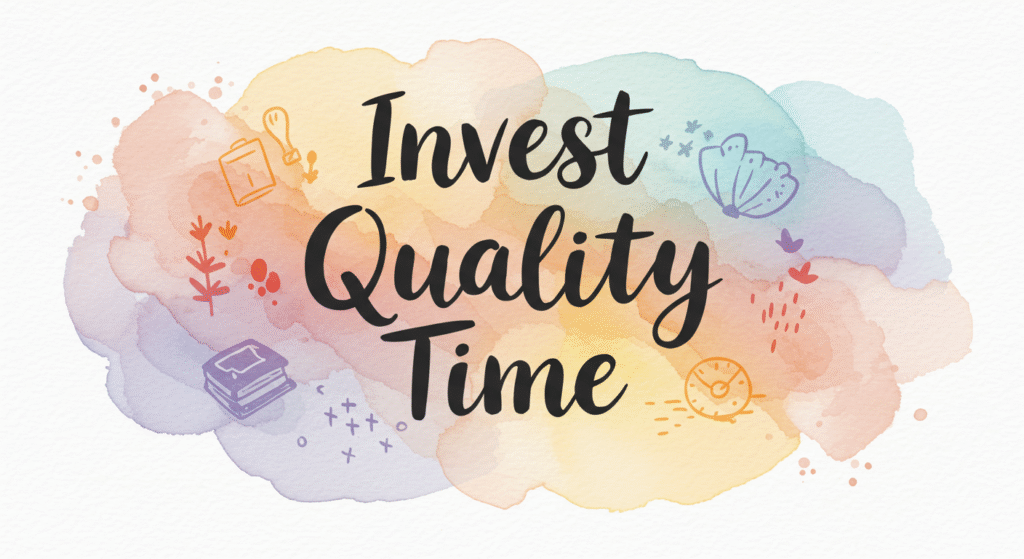Human connection is not just a nice-to-have; it’s a fundamental need. The people we surround ourselves with can either drain our energy or fuel our growth. Cultivating supportive relationships is one of the most powerful investments you can make in your personal development and overall well-being. These connections provide the foundation of trust, encouragement, and honest feedback that helps us navigate life’s challenges and celebrate its victories.
This post will explore practical relationship strategies to help you build and nurture these vital connections. We will look at real-world examples and the psychology behind what makes a relationship truly supportive. You will learn actionable steps for building relationships that contribute directly to your long-term personal growth.
Table of Contents
- Prioritize Active Listening
- Practice Genuine Empathy
- Offer Support Without Judgment
- Celebrate Their Successes
- Communicate Openly and Honestly
- Set and Respect Healthy Boundaries
- Be Consistently Reliable
- Invest Quality Time
- Give and Receive Constructive Feedback
- Show Appreciation and Gratitude
1. Prioritize Active Listening
Active listening is a fundamental skill for building strong and meaningful relationships. Here are some key points to help you prioritize active listening:
- Maintain Eye Contact: This shows the other person that they have your full attention and that you value what they are saying.
- Avoid Interrupting: Allow them to express their thoughts completely before responding. This fosters trust and understanding.
- Listen to Understand, Not to Respond: Focus on grasping their perspective instead of formulating your reply while they’re speaking.
- Use Nonverbal Cues: Nod, smile, or use other positive body language to show that you are engaged.
- Paraphrase and Clarify: Repeat or summarize what they said to ensure you understand them correctly.
- Be Patient: Give them the time they need to express themselves without pressure or rushing.
- Minimize Distractions: Put away your phone or other distractions to be fully present during the conversation.
Active listening is more than just hearing words; it’s about understanding the complete message being sent. It means being fully present in the conversation, without planning your response while the other person is still speaking. When you actively listen, you make the other person feel valued and understood. This is a cornerstone of building a relationship based on mutual respect.
To practice this, put away distractions like your phone, make eye contact, and provide verbal and non-verbal cues that you are engaged. Ask clarifying questions to ensure you understand their perspective.
2. Practice Genuine Empathy
- Put yourself in the other person’s shoes to better understand their feelings and perspective.
- Show care and compassion through your words, tone, and body language.
- Validate their emotions by acknowledging their experiences without dismissing or minimizing them.
- Ask thoughtful and open-ended questions to encourage deeper sharing and connection.
Empathy is the ability to emotionally understand what another person is feeling and see things from their point of view. It’s about putting yourself in their shoes. Unlike sympathy, which is feeling sorry for someone, empathy is feeling with them.
This shared emotional experience strengthens bonds and builds deep trust. The psychology of supportive relationships shows that empathetic connections create a sense of safety and belonging.
Try to imagine the situation from their perspective. Acknowledge their feelings by saying things like, “That sounds incredibly frustrating,” or “I can see why you would feel that way.”
3. Offer Support Without Judgment
- Listen Actively: Focus on truly hearing what the other person is saying without interrupting or forming a response in your mind while they speak. Show that you’re engaged by nodding, maintaining eye contact, and offering verbal affirmations such as “I understand” or “Go on.”
- Avoid Criticism or Blame: Steer clear of language or responses that might make the individual feel judged or at fault. Instead of pointing fingers, validate their emotions and show compassion.
- Ask Open-Ended Questions: Encourage them to share more about their thoughts and feelings by asking questions like, “What do you think would help in this situation?” or “How can I best support you?”
- Respect Their Choices: Even if you don’t agree with how they’re handling the situation, honor their autonomy and decisions. Offering support is about being there for them, not dictating what they should do.
- Be Patient and Present: Some people need time to process their emotions or open up about what they’re going through. Show patience and reassure them that you’re there whenever they’re ready to talk.
A truly supportive relationship is a safe space. People need to feel they can share their vulnerabilities, mistakes, and fears without being judged or criticized. When a friend or partner comes to you with a problem, your role is to support them, not to fix them or pass judgment on their choices. This creates an environment where honest communication can thrive.
Focus on validating their feelings rather than immediately offering solutions. Sometimes, the best support is simply listening and affirming their experience.
4. Celebrate Their Successes
- Acknowledge their achievements, no matter how big or small. This shows that you value their efforts and are genuinely happy for their progress.
- Express your excitement and pride openly. A heartfelt “I’m so proud of you” can go a long way in strengthening your connection.
- Celebrate in ways that are meaningful to them, whether it’s a simple congratulatory message, a thoughtful gift, or a shared experience like a celebratory meal.
- Avoid making comparisons to yourself or others. Focus entirely on their accomplishment and how it reflects their hard work or unique abilities.
- Encourage them to savor the moment and reflect on what they’ve achieved, fostering a sense of gratitude and confidence moving forward.
Support isn’t just for hard times; it’s for the good times, too. Celebrating someone else’s achievements—big or small—shows that you are genuinely happy for them and invested in their success. This counteracts feelings of jealousy or competition and strengthens the partnership. A relationship where both people champion each other’s wins is a powerful engine for mutual growth.
Be enthusiastic and specific in your praise. Instead of a simple “congrats,” try “That’s amazing news! I know how hard you worked for that, and you completely deserve it.”
5. Communicate Openly and Honestly
- Be Transparent: Share your thoughts, feelings, and concerns openly, even if they might be uncomfortable to discuss. Honesty builds trust and ensures both partners are on the same page.
- Listen Actively: Communication also means truly listening to your partner without interrupting or rushing to respond. Show that you value their perspective by giving them your full attention.
- Express Needs Clearly: Avoid dropping hints or expecting your partner to read your mind. Clearly articulating your needs fosters understanding and prevents unnecessary misunderstandings.
- Practice Non-Judgment: Create a safe space for honest conversations by refraining from judgment. This helps your partner feel comfortable sharing their innermost thoughts.
- Regular Check-Ins: Make it a habit to periodically check in with your partner about how they are feeling and how the relationship is going. This ensures issues are addressed before they escalate.
Clear and honest communication is essential for any healthy relationship. This means expressing your own needs, feelings, and thoughts directly and respectfully. It also involves being open to hearing the other person’s truth, even when it’s difficult. Avoiding tough conversations only leads to resentment and misunderstanding. Building relationship resilience depends on the ability to navigate conflict constructively.
Use “I” statements to express your feelings without blaming the other person. For example, say “I feel hurt when…” instead of “You always make me feel…”
6. Set and Respect Healthy Boundaries
- Clearly communicate your needs and limits to others to avoid misunderstandings. Be honest and direct about what you are comfortable with in various situations.
- Be consistent in enforcing your boundaries. This helps others understand their importance and ensures they are respected over time.
- Respect the boundaries of others just as you expect yours to be upheld. Listen actively when someone shares their limits, and avoid crossing them.
- Recognize that setting boundaries is not selfish—it is a vital part of maintaining healthy relationships and protecting your emotional well-being.
- Learn to say “no” without guilt when something goes against your values or exceeds your capacity. Being assertive about your boundaries fosters mutual respect.
- Regularly evaluate and adjust your boundaries based on changing circumstances, relationships, and personal growth.
Boundaries are the limits we set to protect our own well-being. They define what we are and are not comfortable with. In a supportive relationship, both individuals respect each other’s boundaries without question. This demonstrates a deep level of mutual respect and understanding. Boundaries are not walls to keep people out; they are guidelines that make interactions safe and sustainable.
Clearly communicate your boundaries and ask others about theirs. Respecting a “no” is a critical part of building trust.
7. Be Consistently Reliable
Being reliable is a cornerstone of trust in any relationship. It demonstrates to others that they can depend on you when needed and that your words align with your actions. Here are a few key points to consider:
- Follow Through on Promises: Always honor your commitments. If you say you’ll do something, ensure it gets done. Consistency builds trust over time.
- Be Punctual: Respect others’ time by showing up on time for meetings, plans, or appointments. Being late can signal a lack of respect or dependability.
- Communicate Clearly: If unforeseen circumstances prevent you from fulfilling a responsibility, inform the other party promptly and honestly.
- Avoid Overcommitting: Only agree to what you can realistically handle. Overpromising and under-delivering can harm your credibility.
- Show Up Emotionally: Reliability isn’t just about actions; it’s about being present in your relationships emotionally, showing empathy, and offering your support when needed.
By consistently demonstrating reliability, you contribute to the stability and strength of your relationships, fostering deeper trust and mutual respect.
Trust is built on consistency. Being reliable means following through on your commitments and being there for someone when you say you will be. When people know they can count on you, the relationship gains a solid foundation of security.
This applies to small promises, like calling when you say you will, and big ones, like being there during a crisis. Every kept promise helps to enhance the relationship.
8. Invest Quality Time
- Be Present: Quality time is about giving undivided attention. Put away distractions like your phone or work-related tasks and focus entirely on the person you’re spending time with. This shows that you value the moment and the relationship.
- Engage in Activities Together: Plan and participate in activities that both enjoy, such as cooking, hiking, or watching a favorite movie. Shared experiences create lasting memories and deepen connections.
- Have Meaningful Conversations: Set aside time for open and meaningful discussions. Listen actively and share your thoughts to foster greater understanding and emotional intimacy.
- Celebrate Moments: Make a habit of celebrating small and big milestones together, from achievements to everyday gratitude. Recognizing and appreciating these moments strengthens bonds.
- Consistency Matters: Regularly dedicating time to your loved ones helps to maintain the relationship. Even brief, but genuine, moments of connection can make a significant difference over time.
In our busy lives, quality time is a precious commodity. It’s not about the quantity of time spent together but the quality of the interaction. This means giving your undivided attention and engaging in shared activities that strengthen your bond. Meaningful experiences create lasting memories and reinforce the connection you share.
Schedule dedicated, distraction-free time together, whether it’s a weekly coffee, a walk in the park, or a shared hobby.
9. Give and Receive Constructive Feedback
- Be Specific and Objective: When providing feedback, focus on specific behaviors or actions rather than making generalized or personal criticisms. This approach ensures clarity and reduces defensiveness.
- Use a Positive and Supportive Tone: Frame your feedback in a way that encourages growth and improvement by highlighting strengths alongside areas for development.
- Be Open to Feedback Yourself: Encourage an open dialogue by actively listening and being receptive to feedback from others. Acknowledge and learn from constructive criticism to foster mutual respect.
- Provide Actionable Suggestions: Offer clear, achievable steps for improvement to make your feedback practical and valuable.
- Timeliness Matters: Deliver feedback promptly while the context is still fresh. Delayed feedback may lose relevance and impact.
- Create a Safe Environment: Foster a nonjudgmental atmosphere where constructive feedback feels like an opportunity for growth rather than a reprimand.
Supportive relationships encourage growth, and growth often requires honest feedback. The ability to give and receive constructive criticism is a sign of a mature and strong connection. The key is to deliver feedback with kindness and a genuine desire to help, not to hurt.
Likewise, being open to receiving feedback shows that you value the other person’s perspective and are committed to self-improvement.
Frame feedback around specific behaviors, not character traits, and always deliver it in a private, respectful manner.
10. Express your gratitude
- Express your gratitude regularly by saying “thank you” for both small and big gestures. This simple act reinforces positivity and shows that you do not take the other person for granted.
- Highlight specific actions or qualities that you appreciate, making your gratitude more meaningful and personal.
- Write notes or letters of appreciation to convey your feelings in a thoughtful and lasting way.
- Celebrate milestones and achievements together, showing that you genuinely value their efforts and successes.
- Practice active listening when they share their thoughts or experiences, as this demonstrates that you appreciate their presence and ideas.
Never underestimate the power of a simple “thank you.” Regularly expressing appreciation for the people in your life reinforces their value and makes them feel seen. Gratitude shifts the focus to the positive aspects of the relationship and fosters a cycle of mutual generosity.
It’s a simple yet profound way to enhance a relationship.
Make it a habit to notice and mention the small things you appreciate, from their sense of humor to the way they support you.
Strategies for Building Supportive Connections
| Strategy | Actionable Tip | Desired Outcome |
|---|---|---|
| Active Listening | Put your phone away during conversations and ask clarifying questions. | The other person feels heard, valued, and understood. |
| Practicing Empathy | Verbally acknowledge their feelings, e.g., “That sounds really difficult.” | A deeper emotional connection and sense of psychological safety. |
| Non-Judgmental Support | Focus on validating their experience before offering any advice. | Trust is built, and the person feels safe to be vulnerable. |
| Celebrating Success | Be specific and enthusiastic in your praise for their accomplishments. | Mutual encouragement and a reduction in competitive feelings. |
| Open Communication | Use “I” statements to express your needs and feelings clearly. | Conflicts are resolved constructively, preventing resentment. |
| Healthy Boundaries | Clearly state your limits and respect when others state theirs. | Mutual respect and a sustainable, healthy dynamic. |
| Reliability | Follow through on commitments, no matter how small. | A strong foundation of trust and security. |
| Quality Time | Schedule regular, dedicated time for shared activities without distractions. | Strengthened bonds and a bank of positive shared memories. |
| Constructive Feedback | Offer feedback gently, focusing on behavior and with good intent. | Mutual personal growth and relationship improvement. |
| Gratitude | Make a point to regularly thank them for specific things they do. | Increased positivity and a feeling of being appreciated. |
Frequently Asked Questions (FAQs)
1. What does a supportive relationship mean?
A supportive relationship is a connection characterized by mutual empathy, trust, and respect, where individuals feel safe, valued, and encouraged. It involves providing and receiving emotional, practical, and psychological support, fostering an environment where both people can grow.
2. What is an example of a supportive relationship?
An example is a friendship where one friend is starting a new business. The supportive friend listens to their anxieties without judgment, celebrates small milestones with genuine excitement, offers practical help like proofreading a business plan, and provides encouragement after a setback. They champion their friend’s success while offering a safe space to fail. This is one of many supportive relationships examples.
3. What is the 7 7 7 rule in relationships?
The 7-7-7 rule is a guideline for keeping a long-term romantic relationship fresh. It suggests going on a date every 7 days, a weekend away every 7 months, and a vacation every 7 years. While not a strict rule, it emphasizes the importance of continually investing quality time and creating new experiences together.
4. What is a support relationship?
A support relationship is any interpersonal connection that provides assistance or encouragement. This term is often used in professional or therapeutic contexts, but it applies to personal relationships as well. The core function is to provide a reliable source of aid—be it emotional, informational, or tangible—to another person. Finding a supportive relationships synonym could be “nurturing connection” or “sustaining partnership.”
5. How do you build a supportive relationship from scratch?
Building a relationship starts with shared interests and mutual respect. Be proactive by showing genuine interest in others, practicing active listening, being reliable, and offering support. The key is consistency and demonstrating through your actions that you are a trustworthy and caring person.
6. Can a relationship be supportive if we disagree a lot?
Yes. Support is not about constant agreement. A supportive relationship is one where you can disagree respectfully, listen to each other’s perspectives, and find common ground or accept differences without damaging the connection. The ability to navigate conflict constructively is a sign of a strong, supportive bond.
7. What is the psychology behind supportive relationships?
Supportive relationships psychology is rooted in attachment theory and the human need for social connection. These relationships fulfill needs for safety, belonging, and esteem. They act as a buffer against stress, improve mental health by reducing feelings of loneliness, and promote resilience by providing a secure base from which to explore the world and take risks.
8. How do I know if my relationship is unsupportive?
Signs of an unsupportive relationship include feeling consistently drained after interactions, being criticized or judged for your feelings and ambitions, having your successes downplayed, and feeling like your needs are consistently ignored. A lack of trust, empathy, and mutual respect are red flags.
9. What is the difference between being supportive and being a people-pleaser?
Support is a balanced exchange based on genuine care, and it respects the boundaries of both individuals. People-pleasing is often one-sided and driven by a fear of rejection, leading you to sacrifice your own needs and well-being to make others happy. Support is healthy; people-pleasing is unsustainable.
10. How can I find more supportive people?
Look for people in places that align with your values and interests, such as hobby groups, volunteer organizations, or professional networks. When you meet new people, pay attention to how they treat others and whether they exhibit qualities like empathy and reliability. Building relationship networks takes time, so be patient and focus on nurturing the promising connections you make.
Final Thought
Building a supportive network and cultivating healthy relationships requires effort, intentionality, and patience. Remember to prioritize authenticity and mutual respect in your connections. By surrounding yourself with people who uplift and inspire you, you create an environment where you can thrive while also being a source of support for others.












